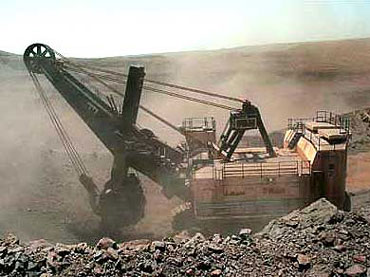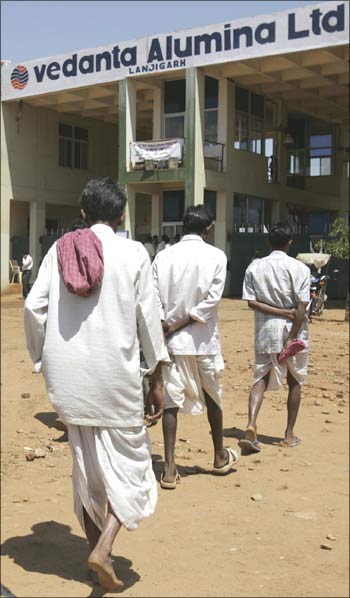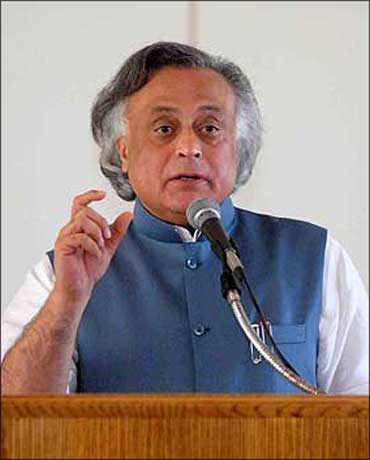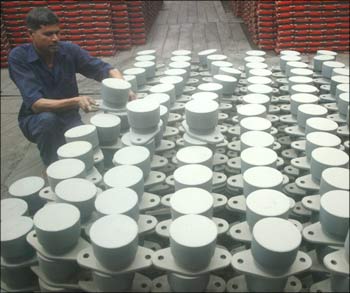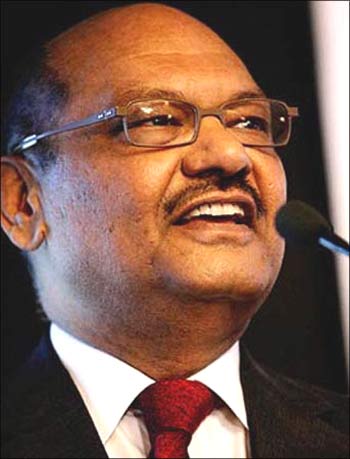 | « Back to article | Print this article |
Why Vedanta verdict is just new wine in old bottle
Activists are a cynical bunch. When a good thing happens, they wonder why.
On August 24, Environment Minister Jairam Ramesh issued a well-argued order denying forest clearance to a bauxite mining project by Sterlite Industries, a Vedanta subsidiary.
If allowed, Vedanta would have lopped off 7 square kilometres of the top of Orissa's Niyamgiri, a hill revered by the few thousand-strong Dongria Kondh tribes.
In the process, it would have killed the numerous streams, the couple of rivers and the thousands of acres of farmland that these sponge-like bauxite hills give life to.
This scary fact is true not merely for Niyamgiri, but for any place in India where bauxite deposits on table-top mountains are extracted.
That is one of the reasons why indigenous communities from Shervaroyan Hills in Tamil Nadu, to the Sirsu Mali, Kuturu Mali, Baphlimali and the hundreds of Malis in Orissa revere the hills.
Ramesh's order cites numerous violations by the company, including fraudulent statements, encroachment of forest land, and expansion of aluminium smelter and refinery without permission.
The language reaffirming the rights of indigenous people, the Dalits was on the mark.
Ramesh's order sent social activists in a tizzy.
E-mail list serves were agog with opinions on whether celebrations were warranted, whether they were premature, whether Ramesh was playing a game, whether it was a Gandhi stunt, whether Posco was traded off for Niyamgiri, whether it was Reliance that had set the government against Sterlite as revenge for Cairn, on how we can celebrate Niyamgiri when the same ministry had cleared Polavaram, Jharsuguda, Pallikaranai, Sompeta ad infinitum.
Clearly in the minority, one rabid optimist wrote, 'The denial of forest clearance to Vedanta signals a new era.'
Click NEXT to read on . . .
Why Vedanta verdict is just new wine in old bottle
Nothing could be further from the truth. The August 24-verdict is a good verdict late in coming -- nothing more; nothing less.
The Saxena Committee has reported many things that the government has already been told.
One lone bureaucrat in the environment ministry's regional office in hostile Bhubaneswar has filed report after honest report documenting compliance violations by Vedanta.
But no action was taken, and no action may ever be taken.
This victory, if it can be called that, is a coming together of various potent elements of grassroots globalisation -- an enigmatic, charismatic tribal identity as the victim of a rapacious, notorious corporation; a fierce and pitched on-the-ground struggle by Niyamgiri Suraksha Samiti and its allies; an assertive environment minister; Rahul Gandhi in search of icons to serve as his electoral platform; institutional investors like the Norwegian pension fund that voluntarily withdrew after conducting their own due diligence; international NGOs.
The victory, though, was won despite the Supreme Court's glossing over of the company's violations reported five years ago to it by its own Central Empowered Committee. At the end of the day, the victory is only partial, and may only be temporary.
Just as one person a day had to be sent to Bakasura as food until he lived, bauxite will have to be carted to Vedanta's refinery until it exists.
Indeed, because Niyamgiri was off-limits for mining, Vedanta was carting its bauxite from 14 distant mines, 11 of which were illegal.
Under environmental law, it is mandatory to prosecute offenders. It is an admitted fact that the original 1 million tonne/year refinery is illegal because it was constructed based on fraudulent claims.
The expansion to 6 million tonnes that is nearly complete is also illegal because it has no permission whatsoever.
Vedanta's 2010 Annual Report presented to shareholders by Anil Agarwal in end July admits that the company has already spent $671 million out of an estimated $1.6 billion budgeted for the expansion project as of March 31, 2010.
Click NEXT to read on . . .
Why Vedanta verdict is just new wine in old bottle
The illegal expansion alone constitutes violation of the Environment Protection Act, Water Act and Air Act -- cause for prosecution on three counts.
To his credit, Ramesh has said that a show-cause notice is being issued to the company with intent to revoke the original environmental clearance for the 1 map a refinery.
But violations of the law, even gross violations, have never been good enough reasons to stop a bad project.
There is no track record of a court or government shutting down a billion-dollar violation, leave alone prosecute a billion-dollar offender for his environmental crimes.
A squatter settlement with even a 1,000 houses may be razed because it violates the law. Just in a few months around the end of 2004, when the Tsunami was uprooting homes in the East Coast, the Corporation of Mumbai demolished more than 85,000 dwellings in the city, leaving 300,000 homeless.
The courts of today would support this. But a billion-dollar corporate violation is a different matter altogether.
Rather, as another example from the Vedanta family demonstrates -- that of Sterlite's controversial copper smelter in Unicorn -- all agencies of the State will align themselves to assist the offender.
On the same day, that Vedanta's 1 million tonne per annum aluminium refinery in Lanjigarh, Orissa, was cleared by the environment ministry, Sterlite too got an environmental clearance to construct a 120,000 tonne per year copper smelter taking total capacity to 300,000 tonne per year.
That was on September 22, 2004, a day after a team of the Supreme Court Monitoring Committee on Hazardous Wastes visited the company's copper smelter in Tuticorin.
"While the existing waste management practices of the unit are not in compliance with the environmental standards and the solid hazardous wastes generated also require to be properly managed, particularly in terms of available space and infrastructure, it would be inadvisable to consider expansion of the unit at this stage . . . the environmental clearance for the proposed expansion should not be granted by the MoE&F.
'If it has been granted, it shall be revoked,' the SCMC wrote in its visit report.
Click NEXT to read on . . .
Why Vedanta verdict is just new wine in old bottle
The SCMC directed the Tamil Nadu Pollution Control Board to investigate the matter of illegal expansion, and take action if illegality was confirmed.
On November 16, 2004, a committee set up by the Tamil Nadir Pollution Control Board revealed that Sterlite had completed construction of rotary holding furnaces, slag cleaning furnace, converter, anode furnace, caster plant, oxygen plant and sulphuric acid plant by September 2004.
Construction of a phosphoric acid plant, copper rod plant and refinery were underway. An oxygen plant and a copper rod plant were also found.
Neither of these fined a mention in the ministry's hastily-issued environmental clearance.
Environmental clearances are issued under the Environmental Protection Act. But this is not sufficient.
Before construction can begin, consent to establish under the Air and Water Acts issued by the State Pollution Control Board is mandatory.
While the Union ministry seems to have had no compunctions in issuing a post-facto clearance, the TNPCB was unable to issue consent to establish because of its ongoing investigations on illegal expansion.
Lack of clearances, though, never stopped Sterlite from doing its thing, while letting its allies in the state cover up its illegalities.
In its annual report dated June 18, 2004, three months before the environmental clearance was issued, Vedanta has declared: "The new copper smelter at Tuticorin is now mechanically complete after some disappointing delays. The new acid and power plants are in use, and full start up will occur as soon as the authorities issue the final permits."
The SCMC's commendable stance on Vedanta's illegalities and clearances was to last only six months.
Set up in 2003 by the Apex Court to monitor the enforcement of environmental laws by regulators and compliance by industries, documents establish that the SCMC facilitated the glossing over of Sterlite's offences in Unicorn.
Click NEXT to read on . . .
Why Vedanta verdict is just new wine in old bottle
A year after the company's bold declaration and four months after the NTSC's own report confirming the illegalities, a director with the ministry of environment & forests wrote to the TNPCB in a letter dated March 4, 2005: 'Regarding expansion of the project without prior permission from appropriate authorities, it was confirmed that while some of the equipment had been installed, there was no expansion in production capacity.'
On April 7, the director, Dr Indrani Chandrasekharan wrote claiming to echo SCMC chairman G Thyagarajan's sentiments: 'The directions issued by SCMC in this regard have been discussed with chairman, SCMC, who has desired that TNPCB may now decide regarding granting consent for expansion to M/s Sterlite Industries India Ltd Tuticorin, Tamil Nadu.'
TNPCB chairperson Girija Vaidyanathan obliged without demur. Thyagarajan's 'desire' is considered as a board agenda item on April 8, and license to operate under Air and Water Acts are issued tithe company by the board on April 19.
There is no provision under law to issue consent to operate for a unit that has no consent to establish. An appointee of the Supreme Court, an official of the union environment ministry, and the head of the TNPCB have worked together in abetting an illegal act. Little wonder then that no action was taken against Sterlite.
So you see, the August-24 handling of Vedanta's mining proposal is not the norm. It is an aberration.
It cannot become a norm unless the Lanjigarh refinery is shut down, and Anil Agarwal is behind bars, and Posco, Polavaram and countless other projects are decided purely on merits, the point of law and on communities' reception to them.
For the cynics to be proven wrong, a lot has to happen.
Rahul Gandhi's 'I'm your soldier in Delhi' stunts notwithstanding, community leaders around the country leading resistances to pollution, mining and other destructive projects are being beaten, humiliated, killed, raped and branded as Maoists or anti-national by his government.
Barely two weeks before his opportunistic arrival in Niyamgiri, Lada Sikaka, an upright and courageous Dongria Kondh leader, was abducted at gun point by Orissa police.
He was detained for four days, beaten black and blue with bamboo sticks and threatened with dire consequences if he continued agitating against Vedanta.
The environment ministry's exceptional analysis of the illegalities in Lanjigarh/Niyamgiri has to be followed up with exemplary punishment to those who authorised it.
Click NEXT to read on . . .
Why Vedanta verdict is just new wine in old bottle
In this case, Anil Agarwal is the guy to go after. And the refinery has to be shut down. Bakasura has to be killed.
This list of actions must be extended to other projects also cleared under questionable circumstances, without paying attention to the environmental and social impacts.
Enforcement of environmental and labour safety laws must be with zero tolerance.
Vedanta is a repeat offender, confident in its faith that the Indian system will deliver. Tuticorin is merely the tip of the iceberg.
Vedanta subsidiary Malco's bauxite mines in Kolli Hills in Tamil Nadu were shut down last year after it was found that the company had no permits -- no clearance, no consent, and no mining permit.
A cartoon in Business India magazine about a decade ago has a corpulent Anil Agarwal squeezing himself through an hour-glass saying, 'In India, you must have patience. Everything will come through.'
The London-based billionaire's understanding of India's decision-makers has so far been frighteningly accurate.
Ramesh has been a breath of fresh air in a ministry that saw the likes of A Raja and T R Baalu.
But all the projects that he does the right thing with will be meaningless if other projects such as Posco and Polavaram are allowed to go ahead.
If Ramesh decides that transparency, the rule of law and the voices of affected communities are what will determine the fate of projects; ordinary people will take to the streets to stave off any pressure that the Prime Minister's Office and other industry lobbyists in the Cabinet may bring to bear on him.
As things stand, Agarwal's cockiness and activists' cynicism are merely two sides of the same coin. Both are based on a thorough understanding of the perverted nature of our State.
The author is an independent journalist and researcher based in Chennai. As an activist, he works closely with communities fighting Sterlite's violations of environment and human rights.

